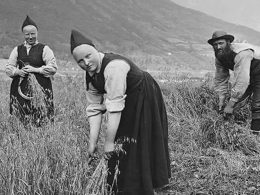Farming landscapes in Scandinavia have undergone significant transformations over the past century, driven by the rise of industrial agriculture. This shift has had a profound impact on rural life, as traditional farming practices have given way to large-scale, mechanized farming operations.
Scandinavian countries such as Sweden, Norway, and Denmark have long been known for their lush green landscapes and rich agricultural heritage. However, the introduction of industrial agriculture has led to a significant increase in the use of synthetic fertilizers, pesticides, and other chemicals, which has had a profound impact on the environment and human health.
According to a report by the European Environment Agency, the use of pesticides in Scandinavian countries has increased by over 50% in the past decade, with many of these chemicals being linked to serious health problems, including cancer and neurological damage.
Despite these concerns, the Scandinavian governments have been slow to implement stricter regulations on the use of these chemicals, with many farmers continuing to rely on them to maintain their yields.
However, there are signs that attitudes are beginning to shift, as consumers become increasingly aware of the environmental and health impacts of industrial agriculture.
In recent years, there has been a growing trend towards organic and sustainable farming practices, with many farmers opting for more environmentally friendly methods.
Organic farming, for example, uses natural methods to control pests and diseases, rather than relying on synthetic chemicals. This approach not only reduces the environmental impact of farming, but also produces healthier, more nutritious food for consumers.
As consumers become more aware of the importance of sustainable agriculture, it is likely that we will see a continued shift towards more environmentally friendly farming practices in Scandinavia and beyond.
In the meantime, it is up to consumers to support farmers who are committed to sustainable agriculture, by choosing organic and locally sourced products whenever possible.
By making informed choices about the food we eat, we can help to create a more sustainable food system that benefits both people and the planet.
As the European Environment Agency notes, ‘the future of farming is not just about producing food, but also about protecting the environment and promoting sustainable development.’








